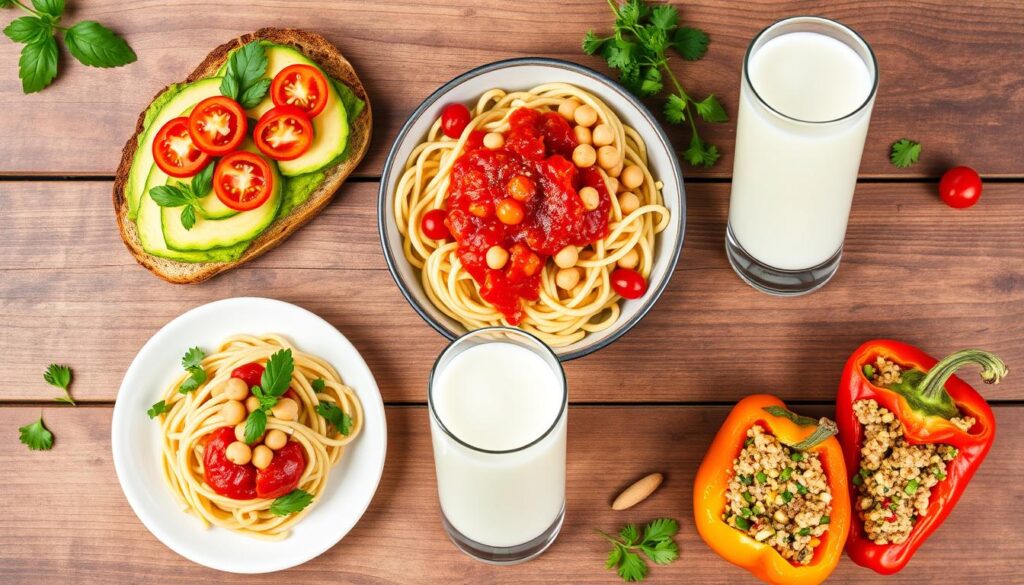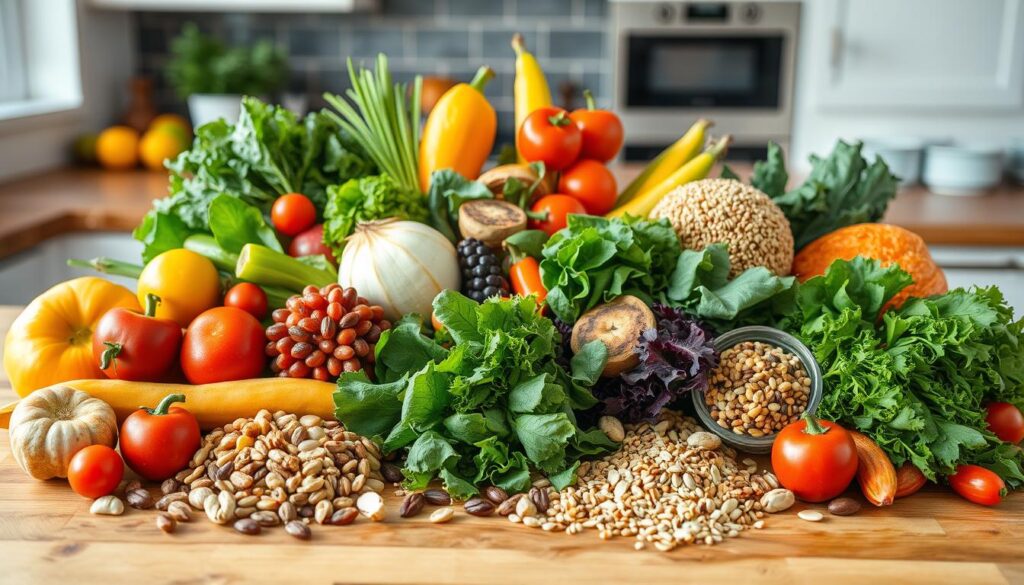If you want to lose weight, try a vegan diet. It’s all about eating plants and no animals. This diet can help you lose weight and feel better.
Vegan diets are full of fiber and low in calories. They also cut out processed foods. This makes them great for keeping your weight in check.
Studies show vegan diets can help you lose more weight than other diets. You can eat until you’re full and still lose weight.
Key Takeaways
- Vegan diets are associated with lower body weight and reduced risk of obesity.
- A well-planned vegan diet can provide all necessary nutrients while promoting weight loss.
- Vegan diets are typically high in fiber, low in calories, and eliminate processed foods, making them effective for weight management.
- Research suggests vegan diets may lead to greater weight loss compared to other diets, even when eating until full.
- Balanced nutrition and portion control are key to successful weight loss on a vegan diet.
Understanding the Basics of Plant-Based Weight Loss
Want to lose weight? Try a vegan diet. Vegan diets are full of whole foods like fruits, veggies, and grains. These foods make you feel full and help with digestion.
These diets are also low in calories and fat. This makes it easier to keep your calorie count down.
What Makes Vegan Diets Effective for Weight Management
Vegan diets work well for losing weight. They cut out processed foods and sugary drinks. These foods often make you gain weight.
Instead, vegan diets focus on nutrient-dense whole foods. These foods are low in calories but high in fiber.
The Science Behind Plant-Based Weight Loss
Studies show vegan diets can help control blood sugar and reduce inflammation. They also boost antioxidant intake. All these help with weight management.
Plant-based meals make you feel fuller than meals with meat and dairy. This can help you eat less.
Key Benefits of Going Vegan
- Lower risk of heart disease, type 2 diabetes, and certain cancers
- Improved blood sugar regulation and reduced inflammation
- Increased intake of essential nutrients like fiber, vitamins, and minerals
- Reduced environmental impact due to the sustainability of plant-based diets
Learning about vegan diets and their benefits can help you reach your health goals.
“Diets rich in fruits and vegetables can reduce the risk of cognitive impairment or dementia by 20%.”
| Statistic | Value |
|---|---|
| Overweight adults in the U.S. | 31% |
| Adults with obesity in the U.S. | 42% |
| Average weight loss on plant-based diets | 4.5 lbs in 18 weeks |
| Average weight loss on whole-foods, plant-based diet | 25 lbs in 1 year |
Vegan Diet for Weight Loss: Creating Your Success Plan
Starting a vegan weight-loss journey needs a good plan. You must make a meal plan that helps you lose weight and gives your body what it needs. A well-planned vegan diet lets you reach your goals and enjoy tasty, healthy meals.
First, plan your meals for the week. Use lots of plant-based foods like veggies, fruits, grains, beans, nuts, and seeds. These foods make you feel full and happy, so you won’t snack on bad foods. Try to eat 80 grams of protein, 208 grams of carbs, and 76 grams of healthy fats every day.
Make a shopping list to get all the right foods. This stops you from buying things you don’t need. Spend some time each week to prep your meals. This makes eating healthy easier and keeps you on track.
- Focus on whole, plant-based foods for a nutrient-dense diet
- Aim for a balanced macronutrient ratio to support your weight-loss goals
- Create a detailed shopping list to avoid impulse purchases
- Set aside time for meal prepping to simplify your daily routine
Remember, losing weight is a journey. Stay consistent and set reachable goals. Keep track of how you’re doing. Look for support online or in local vegan groups. With hard work and the right plan, you can lose weight with a vegan diet.
“A vegan diet can be an effective tool for weight loss and improving overall health. The key is to focus on nutrient-dense, whole plant-based foods and practice portion control.”
Essential Nutrients for a Balanced Vegan Diet
Starting a vegan diet can be very rewarding. But, it’s important to make sure you get all the nutrients you need. Eating foods that are rich in nutrients helps keep your diet balanced and supports your health.
Plant-Based Protein Sources
Getting enough protein is a big question for vegans. But, there are many plant-based foods that have all the amino acids you need. Tofu, tempeh, lentils, chickpeas, and quinoa are great sources of plant-based protein.
Adding these foods to your meals helps you get enough protein every day.
Healthy Fats and Complex Carbohydrates
Fats and carbs are key for a good vegan diet. Healthy fats are in avocados, nuts, and seeds. Complex carbohydrates are in whole grains, starchy veggies, and legumes.
These foods give you lasting energy and important vitamins and minerals.
Critical Vitamins and Minerals
Even with a good vegan diet, some vitamins and minerals might need extra attention. These include vitamin B12, iron, zinc, and omega-3 fatty acids. Eating fortified foods or taking supplements can help you get enough of these nutrients.
By eating a variety of plant-based foods that are rich in nutrients, you can make a vegan diet that’s balanced and fulfilling. It will help you on your weight loss journey and keep you healthy.
Building a Nutrient-Dense Meal Plan
Making a good vegan meal plan is key for losing weight and staying healthy. You should eat whole, plant-based foods. These foods are full of vitamins, minerals, and fiber. Avoid processed vegan foods as much as you can.
For weight loss, a vegan meal plan might have 1,200 to 1,500 calories a day. It should have enough protein, carbs, and fats. This can help you lose 1 to 2 pounds a week.
To meet your nutritional needs, eat:
- Protein-rich foods like beans, lentils, tofu, tempeh, and nuts or seeds
- Whole grains such as quinoa, brown rice, and whole-wheat bread or pasta
- A colorful array of fruits and vegetables to maximize nutrient intake
- Healthy fats from avocado, olive oil, or nut butters
Begin with overnight oats with berries and chia seeds for breakfast. Have lentil and vegetable soup for lunch. For dinner, try a stir-fry with tofu and broccoli.
Snack on fresh fruits, veggies with hummus, or a small handful of nuts. This keeps you full all day.
Creating a vegan meal plan should fit your needs and likes. Try new foods and recipes to keep your meals fun and healthy. With creativity and a focus on whole foods, you can make a meal plan that helps you lose weight and stay healthy.
The Role of Fiber in Vegan Weight Loss
Fiber is key for a healthy, plant-based diet, especially for losing weight. Soluble and insoluble fibers in foods like beans and whole grains help you feel full. Eating lots of fiber-rich vegan foods can really help you lose weight.
High-Fiber Foods to Include
- Legumes (beans, lentils, chickpeas)
- Whole grains (quinoa, brown rice, oats)
- Berries (raspberries, blueberries, blackberries)
- Leafy greens (spinach, kale, broccoli)
- Avocados
- Chia and flax seeds
Daily Fiber Requirements and Benefits
Try to eat at least 25-30 grams of fiber each day for weight loss. Eating 30 more grams of fiber daily can help you lose weight. Fiber also improves heart health, gut health, and digestion.
Start slowly with more fiber to avoid stomach problems. Drink lots of water with your high-fiber vegan foods. This helps with digestion and getting nutrients.
Smart Food Swaps for Vegan Weight Loss
Going vegan can help you lose weight. By choosing better foods, you can eat less without losing nutrients. Here are some easy swaps for plant-based eating and calorie deficit:
- Swap dairy milk for unsweetened plant-based milk like almond, soy, or oat milk.
- Replace cream-based sauces with cashew-based alternatives for a lower-calorie option.
- Choose whole grains like brown rice or quinoa over refined grains like white bread or pasta.
- Use fruit purees or applesauce instead of oil when baking to cut down on added fats.
- Substitute meat with plant-based proteins like lentils, beans, or tofu in your favorite recipes.
- Opt for fresh fruit instead of fruit juices, which can be high in added sugars.
- Snack on air-popped popcorn instead of chips for a satisfying crunch with fewer calories.
These swaps can greatly reduce your calorie intake. They keep your diet full of nutrients. By choosing wisely, you can lose weight on a vegan diet.
| Food Swap | Calories Saved |
|---|---|
| Sugary drinks to diet or sugar-free options, low-fat milk, or water | Up to 750 calories per 1kg bag of sugar |
| Full-fat to reduced-fat cheese | Nearly 1/3 pint of fat |
| Butter to lower-fat butter and spreads | Up to 3/4 pint of fat |
| Sugary cereals to plain cereals | Reduction of 83 sugar cubes per month |
| Whole milk to semi-skimmed milk | Up to 1/3 pint of fat per family over 4 weeks |
| Semi-skimmed to skimmed or 1% milk | Over 1/2 small wine glass (125ml) of fat |
Small changes can add up over time. These plant-based eating swaps will help you reach your calorie deficit weight loss goals.

“Swapping from full-fat to reduced-fat cheese could save nearly a third of a pint of fat.”
Common Mistakes to Avoid on a Vegan Diet
Starting a vegan diet can be great, but watch out for mistakes. Don’t rely too much on processed vegan foods. They can have lots of calories and not enough good stuff. Stick to real, plant-based foods for the best results.
Processing Pitfalls
Vegan burgers and cheese might be easy, but they’re not always good. They can have bad stuff like additives and refined carbs. Choose whole foods like fruits, veggies, and nuts instead. They’re full of fiber and vitamins.
Portion Control Challenges
Vegan diets can help you lose weight, but watch your portions. Foods like nuts and avocados have a lot of calories. Eat the right amount and fill up with lots of whole foods for a balanced diet.
A good vegan diet for losing weight is more than just no animal products. It’s about making smart choices for your health. Avoid mistakes and focus on portion control and eating real, plant-based foods. This way, you can really benefit from a vegan lifestyle for keeping a healthy weight.
Meal Prep and Planning Strategies
Starting a vegan diet for weight loss needs a good meal plan. Spend a few hours each week to cook big batches of healthy foods. This way, you can make quick, balanced meals all week.
Make snacks in advance, like trail mixes or fruit slices. This stops you from eating too much junk. Try new spices to make your vegan food tasty and fun.
Think about what to eat when you’re out or at parties. Keep your pantry full of vegan basics. This makes it easy to make healthy meals fast. Use a meal planning app to help you stay on track with your lifestyle change.
- Dedicate time each week for meal planning and prep
- Cook large batches of grains, legumes, and vegetables for easy meal assembly
- Prepare portioned snacks in advance
- Use a variety of herbs and spices to keep meals interesting
- Plan for challenging situations like dining out or social events
- Stock your pantry with vegan staples for quick meals
- Consider using a meal planning app or service for inspiration and organization

“Meal planning is the key to successful and sustainable weight loss on a vegan diet. By taking the time to prepare and organize your meals, you’ll feel empowered, satisfied, and on track to achieving your health goals.”
Maintaining Nutritional Balance While Losing Weight
Starting your vegan weight loss journey is exciting. It’s key to focus on foods that are full of nutrients. This way, you get all the vitamins and minerals your body needs while losing weight.
Eat a variety of fruits, veggies, whole grains, legumes, nuts, and seeds. These foods are low in calories but full of fiber and antioxidants. Leafy greens like kale and spinach are great for weight loss because they’re packed with nutrients.
Keep track of what you eat with a food diary or app. This helps you see if you need more of certain vitamins or minerals. Talking to a dietitian who knows about vegan nutrition can also help. They can make sure your diet is right for you while you’re losing weight.


A Life-Changing Experience with This Weight Loss Supplement (Nagano Tonic)
I’ve always struggled with finding a weight loss solution that actually works for me. Like many, I’ve tried numerous diets, exercise routines, and supplements over the years—some worked for a short time, but nothing ever gave me long-term results. That was until I decided to try the weight loss supplement I found : Link to the Supplement.
From the moment I started using it, I noticed a difference. Not only did I feel more energized, but my cravings also became more manageable. The best part? I started seeing results much quicker than I anticipated! Over the course of just a few weeks, I noticed a significant reduction in belly fat and overall weight loss that I hadn’t been able to achieve before.
What makes this supplement stand out from all the others I’ve tried is how it supports me in my daily routine without any jitters or energy crashes. I’m able to stay focused and motivated, which has made it easier to stay on track with my diet and exercise plan.
This product truly exceeded my expectations, and I feel more confident and healthier than ever before. If you’re struggling with your weight loss journey like I was, I highly recommend giving this supplement a try. It’s been a game-changer for me, and I’m sure it can work wonders for you too!
Contant Them on email .. tonicnagano50@gmail.com
I’ve tried so many weight loss products over the years, but nothing worked like this supplement! Since I started using it, I’ve noticed a big difference in my energy levels and appetite control. In just a few weeks, I’ve lost weight and feel so much better. It’s been easy to stick with, and the results speak for themselves. Highly recommend this to anyone looking to make a real change!
wasn’t sure what to expect, but this weight loss supplement has really impressed me! After just a few weeks of use, I’ve already dropped a few pounds and feel more motivated to stay active. It’s helped curb my cravings and boosted my energy throughout the day. I’m excited to keep going and see even better results. Definitely worth trying!
Reach them on tonicnagano50@gmail.com
I was skeptical at first, but this supplement has truly made a difference in my weight loss journey. I’ve lost weight without feeling deprived or sluggish. My cravings are under control, and I feel more confident in my body. It’s easy to incorporate into my daily routine, and the results speak for themselves. I’m so glad I gave it a try!
Thanks David, i do use the link to make my purchase. you can get too here http://surl.li/iasppy
I’ve tried so many weight loss products, but this one has been by far the most effective. In just a few weeks, I’ve noticed a visible difference in my body and energy levels. It’s helped me stay on track without the constant hunger pangs and cravings. I’m really happy with my progress and can’t wait to see where I’ll be in another month!
This Nagano Tonic has been amazing! In just a few weeks, I’ve lost weight, feel more energized, and my cravings are under control. Highly recommend it!
Thats the link to purchase http://surl.li/iasppy